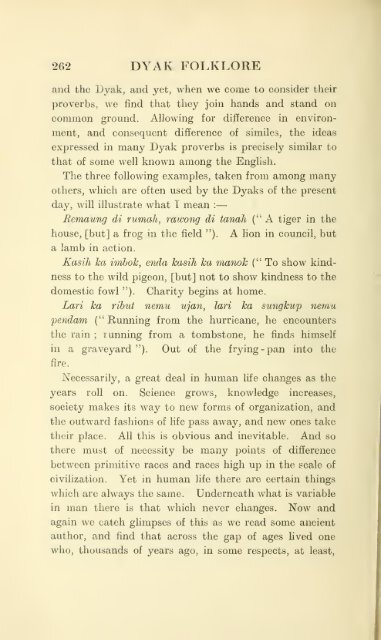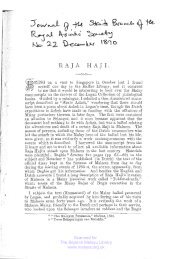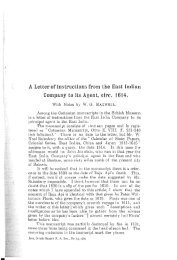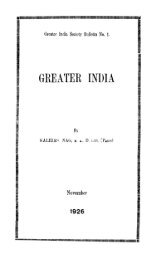- Page 1:
SEVENTEEN YEARS MONG THE SEA DYAKS
- Page 6:
NEW AND RECENT BOOKS Cliff Castles
- Page 9:
seventeen years among The sea dyaks
- Page 13 and 14:
INTRODUCTION WITH the establishment
- Page 15 and 16:
INTRODUCTION ix known, may easily r
- Page 17 and 18:
INTRODUCTION xi into contact with h
- Page 19 and 20:
CONTENTS CHAPTER I SARAWAK—SIR JA
- Page 21 and 22:
CONTENTS xv PAGES Bathing the child
- Page 23 and 24:
CONTENTS xvii CHAPTER XVI DYAK FEAS
- Page 25 and 26:
LIST OF ILLUSTRATIONS PAOB A Dyak G
- Page 27 and 28:
SEVENTEEN YEARS AMONG THE SEA DYAKS
- Page 29:
A Sea Dyak with Shield He is dresse
- Page 32 and 33:
24 SARAWAK—SIR JAMES BROOKE sista
- Page 34 and 35:
2G SARAWAK—SIR JAMES BROOKE any o
- Page 36 and 37:
28 SARAWAK— SIR JAMES BROOKE Afte
- Page 38 and 39:
30 SARAWAK—SIR JAMES BROOKE Saraw
- Page 41 and 42:
SARAWAK—SIR JAMES BROOKE 31 but n
- Page 43 and 44:
CHAPTER II THE DYAKS Tiie word " Dy
- Page 45 and 46:
THE DYAKS 35 used to be a little vi
- Page 47:
Three Typical Dyaks The man on the
- Page 50 and 51:
38 THE DYAKS drawn tightly round th
- Page 52 and 53:
40 THE DYAKS to the eyes from dust
- Page 54 and 55:
CHAPTER III MANNER OF LIFE Dyak vil
- Page 56 and 57:
44 MANNER OF LIFE number of familie
- Page 59 and 60:
MANNER OF LIFE 45 for cooking. The
- Page 61:
Dyak Girls Pounding Rick After the
- Page 64 and 65:
48 MANNER OF LIFE lads turn out imm
- Page 66 and 67:
50 MANNER OF LIFE adze to take the
- Page 69 and 70:
MANNER OF LIFE 51 dug-out boats dra
- Page 73 and 74:
MANNER OF LIFE 53 bark of reeds. Th
- Page 75 and 76:
MANNER OF LIFE 55 the outer edge to
- Page 77:
D H - ^ . 3 t> V t/j X *- V 3 " >
- Page 80 and 81:
58 MANNER OF LIFE to the wooden bar
- Page 82 and 83:
GO MANNER OF LIFE to the nearest Go
- Page 84 and 85:
02 THE DYAK CHARACTER brilliant col
- Page 87 and 88:
THE DYAK CHARACTER 63 work, husk an
- Page 89 and 90:
THE DYAK CHARACTER 65 Then she sole
- Page 91 and 92:
THE DYAK CHARACTER 67 The Dyaks con
- Page 93 and 94:
THE DYAK CHARACTER 69 the first sig
- Page 95 and 96:
THE DVAK CHARACTER 71 one family is
- Page 97 and 98:
HEAD-HUNTING 73 and they are conseq
- Page 101 and 102:
HEAD-HUNTING 75 Again, it was custo
- Page 103 and 104:
HEAD-HINTING 77 the enemy who saw t
- Page 105:
A Dyak in War Dress Holding up his
- Page 108 and 109:
80 HEAD-HUNTING fixed paddles, whic
- Page 110 and 111:
82 HEAD-HUNTING This fence is about
- Page 113 and 114:
HEAD-HUNTING 83 bend of the river,
- Page 115 and 116:
HEAD-HUNTING 85 that none of his fo
- Page 117 and 118:
SOCIAL LIFE 87 much time on the war
- Page 119:
J * > o « 8 5 fee — * 3 a- O a>
- Page 122 and 123:
90 SOCIAL LIFE But this is seldom d
- Page 124 and 125:
92 SOCIAL LIFE is always made to it
- Page 126 and 127:
94 SOCIAL LIFE plates. As a gamecoc
- Page 128 and 129:
CHAPTER VII CHILD-BIRTH AND CHILDRE
- Page 130 and 131:
98 CHILD-BIRTH AND CHILDREN vented,
- Page 132 and 133:
100 CHILD-BIRTH AND CHILDREN which
- Page 134 and 135:
102 CHILD-BIRTH AND CHILDREN friend
- Page 137 and 138:
CHILD-BIRTH AND CHILDREN 103 Even w
- Page 139 and 140:
CHAPTER VIII MY SCHOOL IN THE JUNGL
- Page 141 and 142:
MY SCHOOL IN THE JUNGLE 107 cooking
- Page 143 and 144:
MY SCHOOL IN THE JUNGLE 109 On Satu
- Page 145 and 146:
MY SCHOOL IN THE JUNGLE 111 I took
- Page 147 and 148:
MY SCHOOL IN THE JUNGLE US saw Sara
- Page 149:
J2 «"
- Page 152 and 153:
116 MY SCHOOL IN THE JUNGLE was no
- Page 154 and 155:
118 MY SCHOOL IN THE JUNGLE to sit
- Page 156 and 157:
CHAPTER IX MARRIAGE Courtship —Di
- Page 158 and 159:
122 MAURIAGE the proceedings is for
- Page 160 and 161:
124 MARRIAGE The master of the cere
- Page 163 and 164:
MARRIAGE 125 her to perform that of
- Page 165 and 166:
wedding the bridegroom MARRIAGE 127
- Page 167:
a a 5 § >c = _ c - - ,yj < 5 ^ 3 -
- Page 170 and 171:
130 MARRIAGE your mother-in-law's p
- Page 173 and 174:
MARRIAGE 131 chief, and was often c
- Page 175 and 176:
CHAPTER X BURIAL RITES Life beyond
- Page 177 and 178:
BURIAL RITES 135 of the corpse and
- Page 179:
A Dyak Cemetery by the River-side T
- Page 182 and 183:
138 BURIAL KITES in the grave. Jars
- Page 184 and 185:
UO BURIAL RITES — generally an ol
- Page 186 and 187:
UL' BURIAL RITES Government, it is
- Page 188 and 189:
144 BURIAL KITES others say seven t
- Page 190 and 191:
i k; travelling in Sarawak palm-lea
- Page 193 and 194:
TRAVELLING IN SARAWAK 147 iners, th
- Page 195 and 196:
TRAVELLING IN SARAWAK 149 when the
- Page 197 and 198:
TRAVELLING IN SARAWAK 151 posts of
- Page 199 and 200:
OMENS AND DREAMS 153 Kutok, Embuas,
- Page 201 and 202:
OMENS AND DKEAxMS 155 any new line
- Page 203 and 204:
OMENS AND DREAMS 157 Other people m
- Page 205 and 206:
i-- •: B I " MZV- .-?"! ".lco-ZL
- Page 207 and 208:
A Dyak Youth Holding a Spear He is
- Page 209 and 210:
OMENS AND DREAMS 161 this there is
- Page 211 and 212:
CHAPTER XIII THE "MANANG," OR WITCH
- Page 213 and 214:
"MANANG," OR WITCH-DOCTOR 165 Wheth
- Page 215 and 216:
"MANANG," OR WITCH-DOCTOR 167 choru
- Page 217 and 218:
"MANANG," OR WITCH-DOCTOR 169 names
- Page 219 and 220:
''MANANG," OR WITCH-DOCTOR 171 and
- Page 221 and 222:
"MANANG," OR WITCH-DOCTOR 173 of cl
- Page 223 and 224:
"MANANG," OR WITCH-DOCTOR 175 at fe
- Page 225 and 226:
"MANANG," OR WITCH-DOCTOR 177 doubt
- Page 227 and 228:
•MANANG, OR WITCH-DOCTOR 170 A co
- Page 229 and 230:
"MANANG," OR WITCH-DOCTOR 181 suppo
- Page 231 and 232:
NATIVE REMEDIES AND CHARMS 183 born
- Page 233 and 234:
AND DYAK CHARMS 185 private quarter
- Page 235 and 236:
AND DVAK CHARMS 1ST he was at last
- Page 237 and 238:
AND DVAK CHARMS 189 The thick part
- Page 239 and 240:
AND DYAK CHARMS 191 and he could pa
- Page 241 and 242:
AND DYAK CHARMS 193 away. I took th
- Page 243 and 244:
DYAK RELIGION 195 what we can Dyaks
- Page 245 and 246:
DYAK RELIGION 197 at the Gawai Beni
- Page 247 and 248:
DYAK RELIGION 199 safe to mankind a
- Page 249 and 250:
DYAK RELIGION 201 When Dyaks fell t
- Page 251 and 252:
DYAK RELIGION 203 grass, and rear i
- Page 253 and 254:
DYAK RELIGION 205 •whereabouts. T
- Page 255:
A River Scene The illustration show
- Page 258 and 259:
208 DYAK RELIGION The Sea Dyak beli
- Page 260:
210 DVAK FEASTS great length connec
- Page 264 and 265:
212 DYAK FEASTS the man of greatest
- Page 267 and 268:
DYAK FEASTS 213 in a monotonous man
- Page 269 and 270: DYAK FEASTS 215 and offerings arc m
- Page 271 and 272: DYAK FEASTS 217 been cooked is make
- Page 273 and 274: DYAK FEASTS 210 asks for food, at o
- Page 275 and 276: SPORTS AND AMUSEMENTS 221 on other
- Page 277: •J
- Page 280 and 281: 224 SPOUTS AND AMUSEMENTS The Dyaks
- Page 282 and 283: 226 SONG AND MUSIC with the strokes
- Page 284 and 285: 228 SONG AND MUSIC round the sick m
- Page 286 and 287: 230 SONG AND MUSIC order of importa
- Page 288 and 289: 282 SONG AND MUSIC hand brush the s
- Page 290 and 291: 234 THE DYAK ABROAD themselves. One
- Page 292 and 293: 236 THE DYAK ABROAD The Leaves are
- Page 294 and 295: 238 THE DYAK ABROAD would imagine t
- Page 296 and 297: CHAPTER XX SOME PERSONAL EXPERIENCE
- Page 298: 242 SOME PERSONAL EXPERIENCES a " s
- Page 302 and 303: 244 SOME PERSONAL EXPERIENCES Happi
- Page 304 and 305: 246 SOME rEltSONAL EXPERIENCES cann
- Page 306 and 307: 248 SOME PERSONAL EXPERIENCES equal
- Page 308 and 309: 250 SOME PERSONAL EXPERIENCES It se
- Page 310 and 311: CHAPTER XXI DYAK FOLKLORE Sea Dyak
- Page 312 and 313: 254 DYAK FOLKLORE of the morning. T
- Page 314 and 315: 256 DYAK FOLKLORE me have what I wa
- Page 316 and 317: 258 DYAK FOLKLORE " I think I do,"
- Page 318 and 319: 200 DYAK FOLKLORE They scratched th
- Page 322 and 323: CHAPTER XXII THREE DYAK LEGENDS Dj'
- Page 324 and 325: 266 THREE DYAK LEGENDS enemy, he wa
- Page 326 and 327: 268 THREE DYAK LEGENDS parts of the
- Page 329 and 330: THREE DYAK LEGENDS 260 started and
- Page 331 and 332: THREE DYAK LEGENDS 271 He followed
- Page 333 and 334: THREE DYAK LEGENDS 278 mat in your
- Page 335 and 336: THREE DYAK LEGENDS 275 made the sam
- Page 337 and 338: THREE DYAK LEGENDS 277 never to eat
- Page 339 and 340: THREE DYAK LEGENDS 279 the many cha
- Page 341: A Dyak using v Wooden Blow-pipe He
- Page 344 and 345: 282 THREE HYAK LEGENDS the while wh
- Page 346 and 347: 284 THREE DYAK LEGENDS My father di
- Page 348 and 349: 286 THREE DYAK LEGENDS what you hav
- Page 350 and 351: 288 THREE DYAK LEGENDS Some of the
- Page 352 and 353: 290 THREE DYAK LEGENDS but she woul
- Page 355 and 356: THREE DYAK LEGENDS 291 In the meant
- Page 357 and 358: THREE DYAK LEGENDS 293 it took the
- Page 359 and 360: THREE DYAK LEGENDS 205 son, and I h
- Page 361: - * & - « * ,2 3 ' =• 5-3 i. 91
- Page 364 and 365: 298 THREE DYAK LEGENDS Burong, " an
- Page 366 and 367: 300 THREE DYAK LEGENDS and harvest,
- Page 368 and 369: 302 THREE DVAK LEGENDS " Now I have
- Page 370 and 371:
;*()4 THREE DYAK LEGENDS in his cou
- Page 372 and 373:
306 THREE DYAK LEGENDS forest, all
- Page 374 and 375:
.308 THREE DYAK LEGENDS " You have
- Page 376 and 377:
:U0 THREE DYAK LEGENDS they like ?"
- Page 378 and 379:
312 THREE DYAK LEGENDS here all nig
- Page 380 and 381:
314 THREE DYAK LEGENDS supernatural
- Page 382 and 383:
CHAPTER XXIII SOME CURIOUS CUSTOMS
- Page 384 and 385:
318 SOME CURIOUS CUSTOMS on his own
- Page 386 and 387:
320 SOME CURIOUS CUSTOMS it, and re
- Page 388 and 389:
822 SOME CURIOUS CUSTOMS I said in
- Page 390 and 391:
CHAPTER XXIV THE FUTURE OF THE SEA
- Page 392 and 393:
320 THE FUTURE OF THE ready of farm
- Page 395 and 396:
SEA DYAK IN SARAWAK 327 trifling pa
- Page 397 and 398:
SEA DYAK IN SARAWAK 329 among the l
- Page 399 and 400:
SEA DYAK IN SARAWAK 331 for plantin
- Page 401 and 402:
GLOSSARY 333 Berua, " swinging." Na
- Page 403 and 404:
GLOSSARY ;335 Lesong, a wooden mort
- Page 405 and 406:
GLOSSARY 337 Siren, a vine of the p
- Page 409 and 410:
Captives, 94 Caves, edible birds'-n
- Page 411 and 412:
ilanang, or witch-doctor, the, 163
- Page 413:
War boat, 79, 266 War costume, 78 c
- Page 416 and 417:
CATALOGUE OF BOOKS Arranged alphabe
- Page 418 and 419:
Seeley V Co Limited CHURCH, Rev. AL
- Page 420 and 421:
Seeley & Co Limited CRAIK, Mrs. Joh
- Page 422 and 423:
Seeley & Co Limited HEROES OF THE W
- Page 424 and 425:
Seeley & Co Limited MARSHALL, EMMA
- Page 426 and 427:
Seeley ftp Co Limited THE PINK LIBR
- Page 428 and 429:
Seeley & Co Limited THE LIBRARY OF
- Page 430:
Seeley WINCHESTER, M. E. Adrift in

















